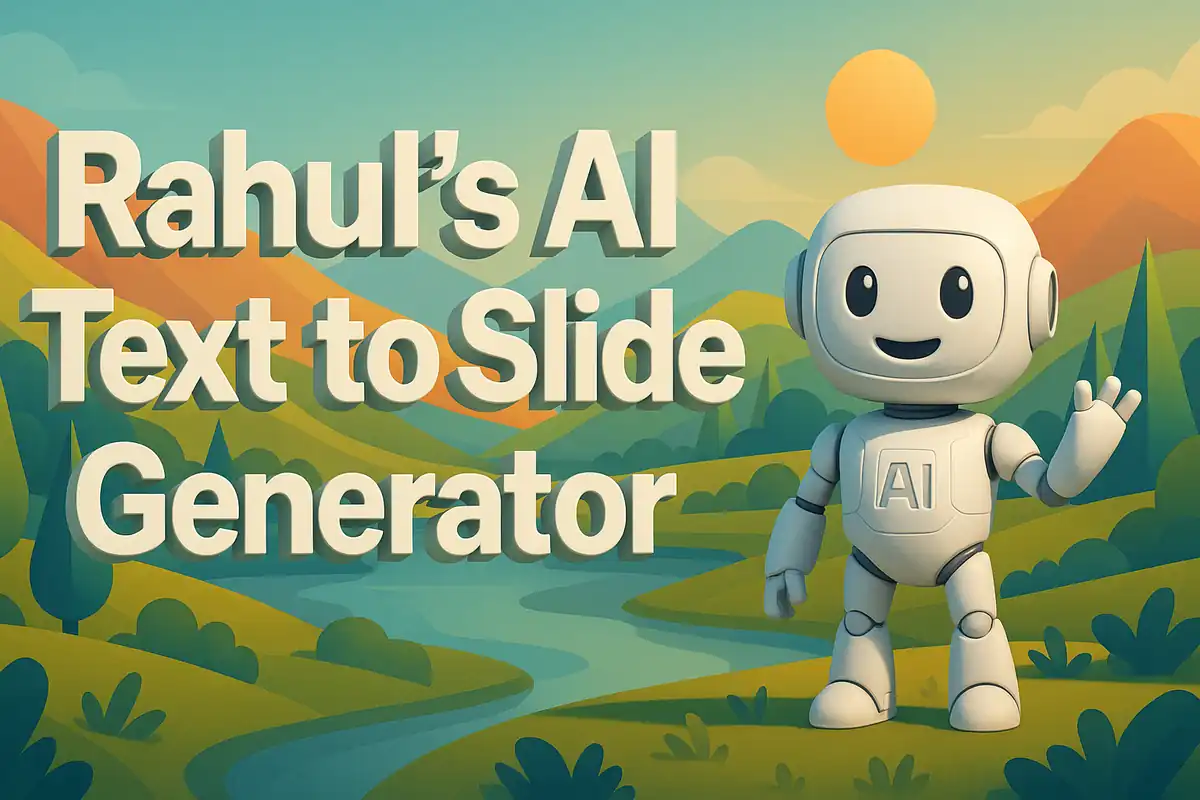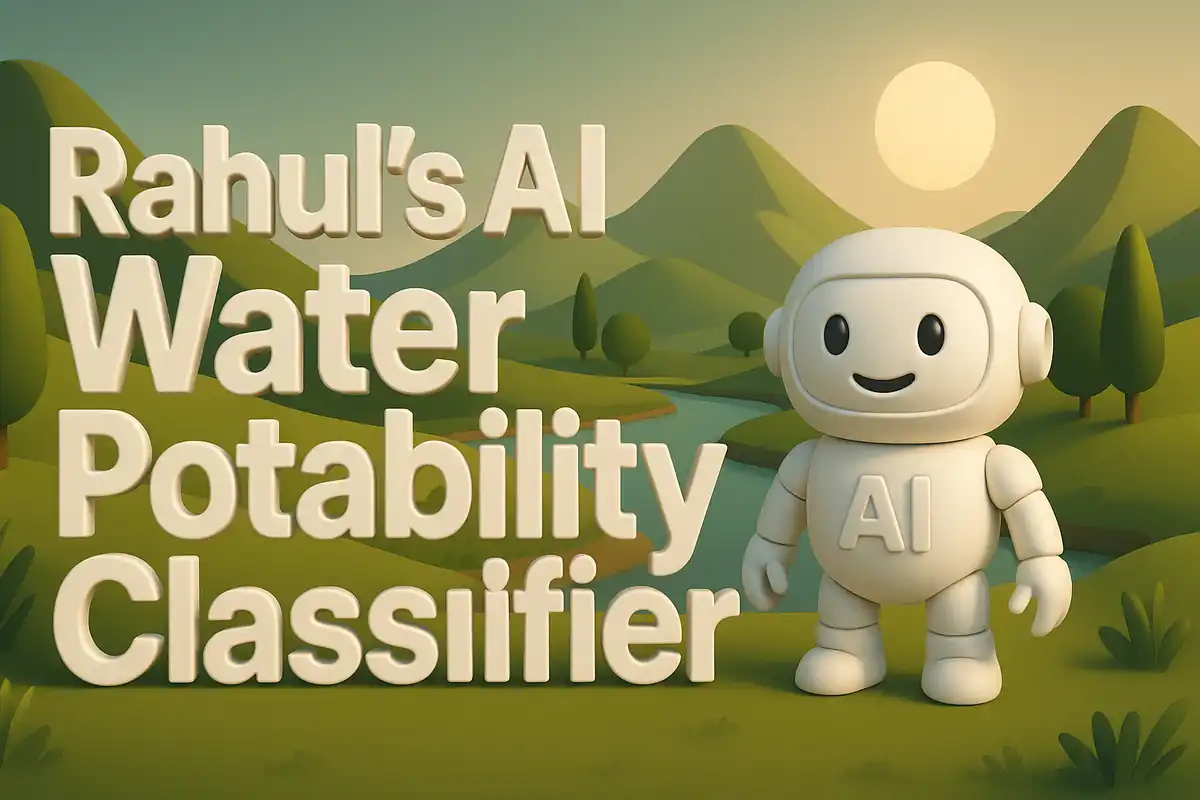My AI Text to Slide Generator
This project turns free-form text into a branded slide deck using Streamlit, OpenAI, or an offline rule-based generator, and converts the result into a downloadable PowerPoint using python-pptx.

What this app does
- Accepts a topic/paragraph and a brand color.
- Generates a deck JSON (with titles and bullets) using either OpenAI or an offline rule-based generator.
- Scores the result for basic quality.
- Converts the JSON into a downloadable PowerPoint (.pptx).
File 1 — app.py
Imports and configuration
The top imports bring in streamlit, typing helpers, json, time, and utility modules. The app later calls into utils_pptx.py to build the PowerPoint.
1) Call-rate limiting
COOLDOWN_SECONDS = 8
DAILY_LIMIT = 60
HOURLY_SHARED_CAP = 200
def init_rate_limit_state():
...
def can_call_now() -> Tuple[bool, str, int]:
...
def record_successful_call():
...
def _shared_hourly_counters():
...
def _hour_bucket(ts=None):
...
Ensures API usage is controlled and user-friendly.
2) Content shape constraints
MAX_TITLE_WORDS = 12
MIN_CONTENT_SLIDES = 4
MAX_CONTENT_SLIDES = 10
MIN_BULLETS = 3
MAX_BULLETS = 6
MAX_BULLET_WORDS = 16
Defines structural rules for slide content.
3) Data models
class SlideModel(TypedDict):
title: str
bullets: List[str]
class DeckJSON(TypedDict):
title: str
subtitle: str
slides: List[SlideModel]
class Slide(NamedTuple):
title: str
bullets: List[str]
class Deck(NamedTuple):
title: str
subtitle: str
slides: List[Slide]
Schema for JSON interchange and internal deck representation.
4) OpenAI generation
def call_openai(topic: str, model: str, temperature: float, max_tokens: int) -> str:
# Crafts system prompt and calls OpenAI API
return response_text
Generates a JSON deck from OpenAI models.
5) Text utilities
def naive_sentence_split(text: str) -> List[str]:
...
def extract_keywords(text: str, k: int = 6) -> List[str]:
...
def chunk_list(xs: List[str], n: int) -> List[List[str]]:
...
Support functions for offline deck generation.
6) Offline deck generator
def generate_offline_deck_json(topic: str, brand_hex: str) -> DeckJSON:
...
Produces a structured deck without external APIs.
7) JSON hardening
def coerce_json_block(s: str) -> str:
...
Extracts and sanitizes valid JSON from model outputs.
8) Deck scoring
def score_deck(dj: DeckJSON) -> Tuple[float, dict]:
...
Computes quality heuristics for slide content.
9) Streamlit UI
st.set_page_config(page_title="AI Text → Slides", page_icon="📑", layout="wide")
provider = st.selectbox("Provider", ["OpenAI", "Offline (rule-based)"])
model = st.selectbox("Model (OpenAI)", ["gpt-4o-mini", "gpt-4o", "gpt-4.1-mini"])
brand = st.color_picker("Brand color", value="#0F62FE")
temp = st.slider("Creativity (OpenAI)", 0.0, 1.0, 0.4, 0.05)
max_tokens = st.slider("Max tokens (OpenAI)", 256, 2048, 900, 32)
topic = st.text_area("Enter topic or paragraph", height=160)
if st.button("Generate Slides"):
...
Controls UI, model selection, and output display.
File 2 — utils_pptx.py
1) Color helpers
def hex_to_rgb(hex_color: str) -> Tuple[int, int, int]:
...
def apply_brand_to_title(shape, rgb):
...
Handles brand coloring.
2) Slide builders
def add_title_slide(prs, title, subtitle, rgb):
...
def add_content_slide(prs, title, bullets):
...
Adds title and content slides.
3) Deck to PPTX
def deck_to_pptx_bytes(deck: Deck, brand_hex: str) -> bytes:
...
Assembles and exports deck to .pptx bytes.
End-to-end flow
- User enters text and color.
- Deck is generated (OpenAI or offline).
- JSON is validated and scored.
- Deck is converted into
.pptx. - User downloads slides.
Run locally
pip install -r requirements.txt
streamlit run app.py
For OpenAI mode:
export OPENAI_API_KEY="sk-..."
Offline mode works without internet.


